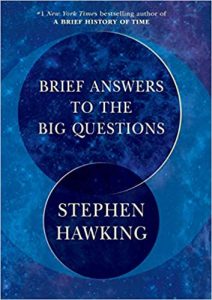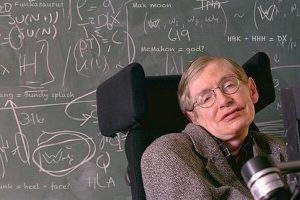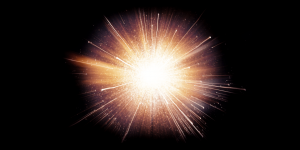史蒂芬.霍金(Stephen Hawking)在2018年十月份出版了Brief Answers to the Big Questions,中譯:《 十問:霍金沉思錄》,書中他以淺白的方式回答人類不斷探索的十大問題。
第一章 上帝存在嗎?
第二章 一切如何開始?
第三章 宇宙中存在其他智慧生命嗎?
第四章 我們能預測未來嗎?
第五章 黑洞中是什麼?
第六章 時間旅行可能嗎?
第七章 我們能在地球上存活嗎?
第八章 我們應去太空殖民嗎?
第九章 人工智能會不會超過我們?
第十章 我們如何塑造未來?

以下是筆者讀完第一章「上帝存在嗎?」所摘錄的片段。
一. 霍金是否是無神論者?
霍金是個無神論者,其實身為科學家,他相信科學比宗教更能合理解釋宇宙的起源。在西方國家大多數信奉聖經的基督教、天主教徒認為宇宙的起源就像聖經所描述一般,上帝創造萬有。聖經中的上帝是唯一的神「耶和華」,祂從創世以來就主宰著人類的命運和世界演變的走向。在聖經中上帝是人格化的,耶和華如同慈愛的天父憐憫世上的兒女、憎恨世上造罪的人,是個賞罰分明的上帝。

然而霍金相信的是科學,他認為科學不斷的發現宇宙的真理,也就宇宙中運行一切的法則『自然定律』,這些定律在過去、現在、未來一直主宰著萬物的運行方式。因此他所認為的上帝,是非人稱的,是「自然定律」的代名詞。了解上帝的心意就是了解自然定律。
我相信這些定律的發現是人類最偉大的成就,因為正是這些自然定律,正如我們現在所說的那樣,將告訴我們是否需要神來解釋宇宙。
I believe that the discovery of these laws has been humankind’s greatest achievement, for it’s these laws of nature- as we now call them – that will tell us whether we need a god to explain the universe at all. 1Hawking,S. (2018). Brief Answers to the Big Questions (Illustrated ed.). Bantam. p27
自然定律是對事物在過去、現在和未來的實際運行方式的描述。
The laws of nature are a description of how things actually work in the past, present and future. 2Hawking,S. (2018). Brief Answers to the Big Questions (Illustrated ed.). Bantam. p27
我像愛因斯坦一樣在非個人意義上使用「上帝」這個詞來表示自然法則,所以了解上帝的思想就是了解自然定律。我的預感是,我們將在本世紀末了解上帝的心意。
I use the word “God” in an impersonal sense, like Einstein did, for the laws of nature, so knowing the mind of God is knowing the laws of nature. My predition is that we will know the mind of God by the end of this century. 3Hawking,S. (2018). Brief Answers to the Big Questions (Illustrated ed.). Bantam. p28
二. 霍金與道家哲學
在讀完霍金的第一章:「上帝存在嗎?」霍金有許多觀點與道家的哲理十分相近,霍金相信宇宙的起源於大爆炸,天地萬有都來自於無。誠如老子《道德經》第四十章:「天下萬物生於有,有生於無。」霍金所說的無,是一種依據自然定律而生發一切萬物的起源,這些自然定律,就好比老子所說的「道」,在天地形成之前就存在了,人要遵循地球的規律特性,地球遵循著宇宙的規律,宇宙皆以道作為運行的依據,而道自然而然。《道德經》第二十五章:「人法地,地法天,天法道,道法自然。」
我認為根據科學定律,宇宙是從無到有自發地創造出來的。科學的基本假設是科學決定論。科學定律決定了宇宙在某一時刻的狀態的演化。這些定律可能是上帝頒布的,也可能不是,但他不能干預以破壞定律,否則它們就不是定律。這讓上帝可以自由選擇宇宙的初始狀態,但即使在這裡,似乎也可能有定律。所以上帝根本就沒有自由。
I think the universe was spontaneously created out of nothing, according to the laws of science. The basic assumption of science is scientific determinism. The laws of sciense determine the evolution of the universe given its state at one time. These laws may, or may not, have been decreed by God, but he cannot intervene to break the laws, or they would not be laws. That leaves God with the freedom to choose the initial state of the universe, but even here it seems there may be laws. So God would have no freedom at all. 4Hawking,S. (2018). Brief Answers to the Big Questions (Illustrated ed.). Bantam. p29

當人們問我是否是上帝創造了宇宙時,我告訴他們這個問題本身沒有意義。宇宙大爆炸之前不存在時間,所以沒有時間讓上帝創造宇宙。這就像問地球邊緣在何方,地球是一個沒有邊緣的球體,所以這種尋問是徒勞的。
When people ask me if a God created the universe, I tell them that the question itself makes no sense. Time didn’t exist before the Big Bang so there is no time for God to make the universe in. It’s like asking for directions to the edge of the Earth- the Earth is a sphere that doesn’t have an edge, so looking for it is a futile exercise. 5Hawking,S. (2018). Brief Answers to the Big Questions (Illustrated ed.). Bantam. p38
沒有人創造了宇宙,也沒有人主宰我們的命運。這讓我有了一個深刻的領悟:可能也沒有天堂和來世。我認為相信來世只是痴心妄想(…)我認為當我們死去時,我們會歸於塵土。但是有一種感覺是我們賴以生存的感覺,是我們的影響力,以及我們傳遞給孩子的基因。我們有這一生能欣賞宇宙宏偉的設計,對此我非常感激。
No one created the universe and no one directs our fate. This leads me to a profound realisation: there is probably no heaven and afterlife either. I think belief in an afterlife is just wishful thinking(…) I think that when we die we return to dust. But there’s a sense in which we live on, in our influence, and in our genees that we pass on to our children. We have this one life to appreciate the grand design of the universe, and for that I am extremely grateful. 6Hawking,S. (2018). Brief Answers to the Big Questions (Illustrated ed.). Bantam. p38